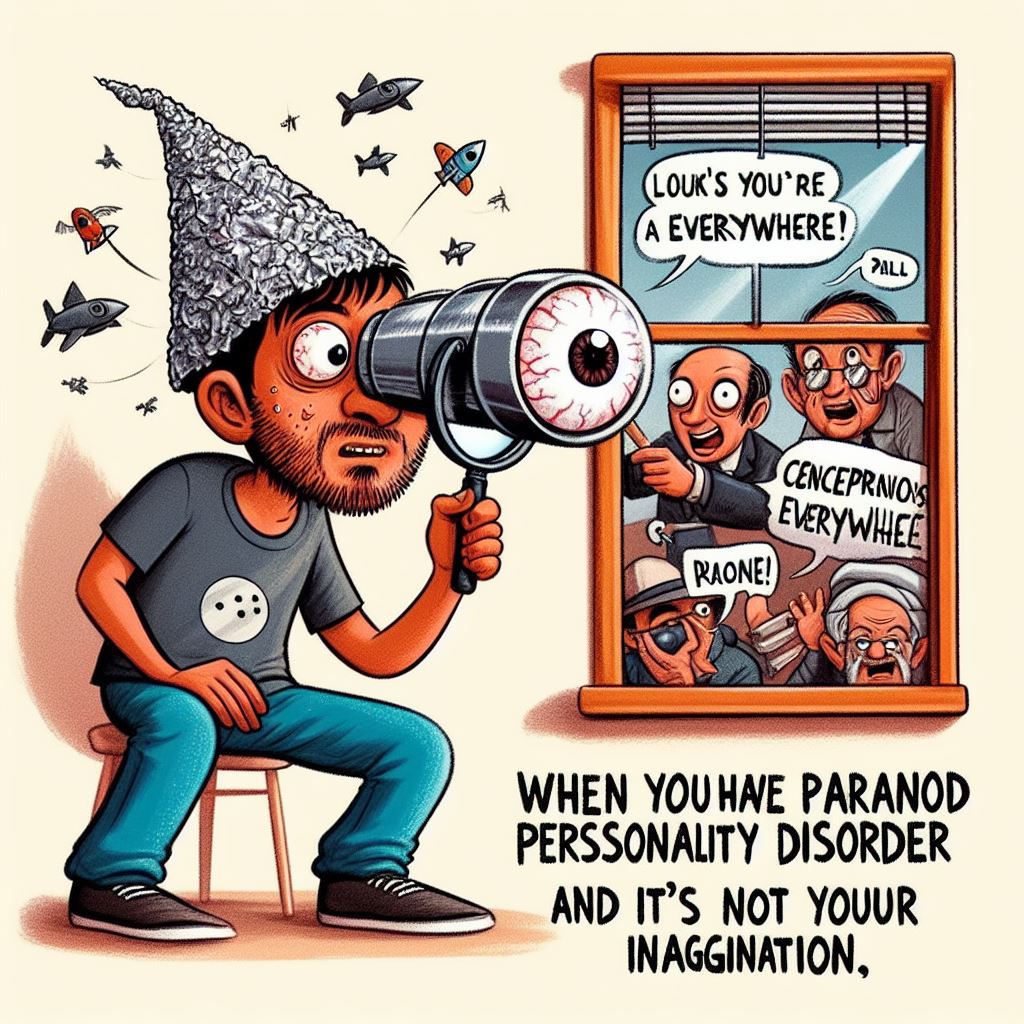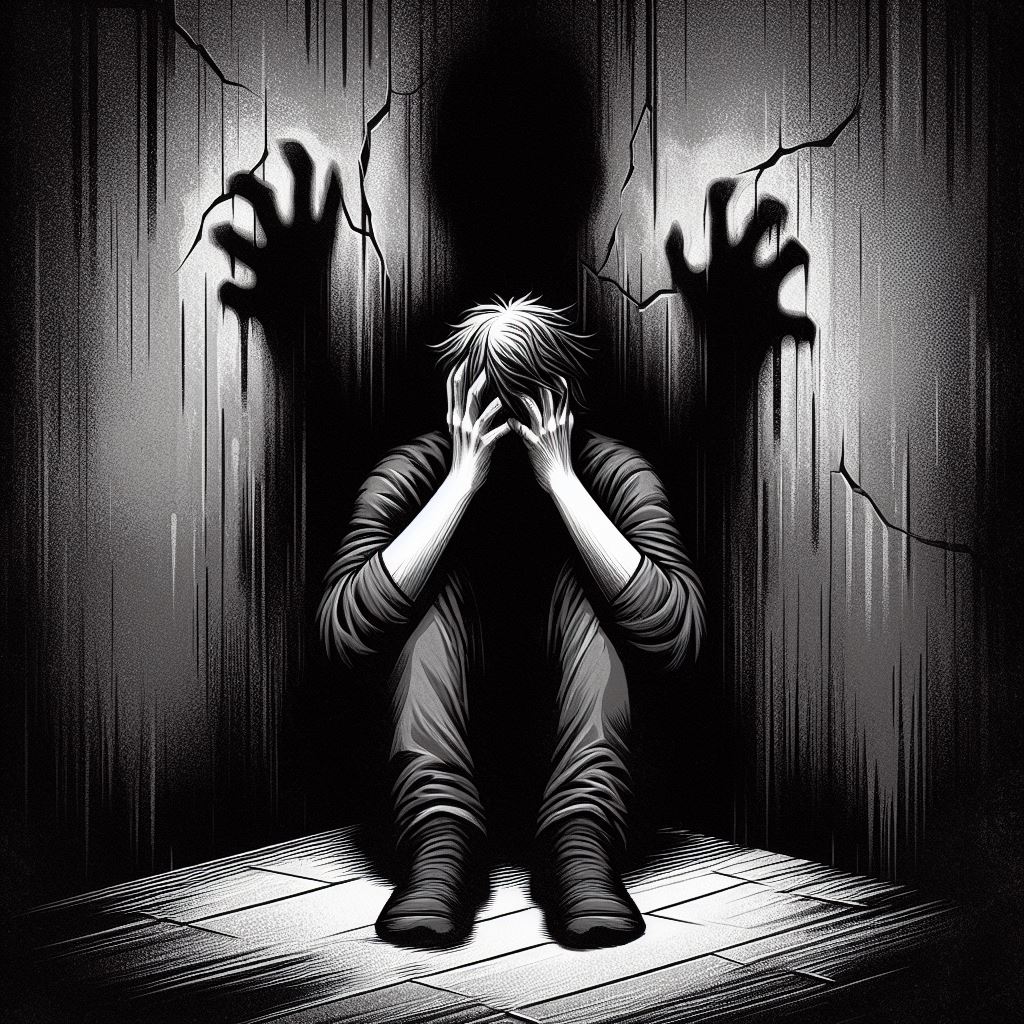Your cart is currently empty!
What Is Paranoid Personality Disorder?

Paranoid personality disorder (PPD) is a mental health condition that affects how a person thinks and behaves towards others. People with PPD have a persistent and pervasive pattern of distrust and suspicion, often interpreting others’ motives as malicious or harmful. They may also experience psychotic symptoms, such as delusions and hallucinations, that reinforce their distorted beliefs.
PPD can cause significant impairment in social, occupational, and personal functioning, as well as increased risk of depression, anxiety, substance abuse, and suicidal behavior. PPD is estimated to affect about 2.3% of the general population and is more common in men than in women.
The exact causes of PPD are not well understood, but some possible factors include genetic predisposition, early childhood trauma, cultural influences, and brain abnormalities. PPD is often associated with other mental health conditions, such as schizophrenia, borderline personality disorder, delusional disorder, and avoidant personality disorder.
The main symptom of PPD is a chronic and unjustified mistrust of others, even when there is no evidence or reason to support it. People with PPD may exhibit some or all of the following behaviors:
- They are constantly on guard for signs of betrayal, deception, or exploitation by others.
- They are reluctant to confide in or share personal information with anyone, fearing it will be used against them.
- They are hypersensitive to criticism, insults, or perceived slights, and may react angrily or with hostility.
- They hold grudges and do not forgive easily.
- They are suspicious of the loyalty or trustworthiness of their friends, family members, partners, or colleagues.
- They may accuse others of having hidden agendas or ulterior motives, or of plotting against them or conspiring to harm them.
- They may believe that they are the target of persecution, harassment, or discrimination by others or by institutions (such as the government, the media, or the legal system).
- They may have delusions of grandeur or persecution, such as believing that they have special abilities or powers, or that they are being followed, watched, or monitored by enemies.
- They may experience hallucinations of voices or images that confirm their paranoid beliefs or threaten them.
Some examples of how PPD can affect a person’s life are:
- A person with PPD may refuse to seek medical help for a serious condition, fearing that the doctors or nurses are trying to poison them or implant devices in their body.
- A person with PPD may isolate themselves from their family and friends, believing that they are all in league against them or have been replaced by impostors.
- A person with PPD may quit their job or drop out of school, thinking that their boss or teachers are sabotaging their performance or setting them up for failure.
- A person with PPD may become violent or aggressive towards others whom they perceive as threatening or hostile, even if they are innocent bystanders or authority figures.
The diagnosis of PPD is based on clinical criteria and a thorough psychological evaluation. There is no specific test for PPD, but some tools that may be used to assess the severity and impact of the symptoms include:
- The Structured Clinical Interview for DSM-5 (SCID-5)
- The Minnesota Multiphasic Personality Inventory (MMPI)
- The Paranoid Personality Disorder Scale (PPDS)
- The Paranoid Thoughts Scale (PTS)
The treatment of PPD can be challenging due to the nature of the disorder and the resistance of the patients to seek help or trust the therapists. However, some options that may be helpful include:
- Cognitive-behavioral therapy (CBT), aims to identify and challenge the distorted thoughts and beliefs that fuel the paranoia and teach coping skills to manage emotions and behaviors.
- Antipsychotic medication can reduce the intensity and frequency of psychotic symptoms such as delusions and hallucinations.
- Psychoeducation involves providing information and support to the patients and their families about the disorder and its treatment.
- Social skills training helps to improve the communication and interpersonal skills of the patients and enhance their social functioning.
PPD is a serious and chronic condition that can cause significant distress and impairment in various aspects of life. However, with proper diagnosis and treatment, some people with PPD can achieve a better quality of life and reduce their suffering.
One question that may arise when learning about PPD is how it differs from obsessive-compulsive disorder (OCD). OCD is another mental health condition that involves recurrent and intrusive thoughts (obsessions) and repetitive behaviors (compulsions) that aim to reduce anxiety caused by the obsessions. OCD can also cause impairment in social, occupational, and personal functioning. The main difference between PPD and OCD is that people with PPD have paranoid beliefs that are not based on reality, while people with OCD have insight into the irrationality of their obsessions and compulsions. People with PPD are convinced that others are out to harm, deceive, or exploit them, and they often interpret benign events as malicious or threatening. People with OCD, on the other hand, recognize that their fears and rituals are excessive and unreasonable, but they feel unable to control them. Another difference is that people with PPD tend to isolate themselves from others and avoid seeking help, while people with OCD may seek professional treatment or support from family and friends.

Paranoid personality disorder (PPD) is a mental health condition characterized by persistent and pervasive mistrust and suspicion of others, even when there is no reason to be suspicious. People with PPD may feel constantly on guard, believe that others are out to harm or deceive them, and have difficulty trusting or confiding in anyone. They may also interpret benign remarks or events as malicious or threatening, and react with anger or hostility.
The early signs and symptoms of PPD may include:
- Excessive doubt or suspicion of others’ motives or intentions
- Fear of being exploited, harmed, or betrayed by others
- Reluctance to share personal information or confide in anyone
- Hypersensitivity to criticism or perceived insults
- Holding grudges and being unforgiving of perceived slights
- Difficulty relaxing or letting go of worries
- Perceiving hidden meanings or threats in ordinary comments or situations
- Having rigid or extreme beliefs that are not supported by evidence
- Being overly self-reliant and independent
- Having trouble working or cooperating with others
Recognizing and seeking help for PPD can be challenging, as people with this condition may not acknowledge that they have a problem or may distrust mental health professionals. However, early recognition and intervention can lead to better outcomes, as PPD can cause significant distress and impairment in various aspects of life, such as relationships, work, and social functioning.
One of the main goals of treatment for PPD is to help the person develop more realistic and positive views of themselves and others and to reduce their fear and paranoia. Treatment may involve psychotherapy, medication, or a combination of both. Psychotherapy can help the person identify and challenge their distorted thoughts and beliefs, learn coping skills and strategies to manage their emotions and behaviors and improve their self-esteem and communication skills. Medication can help reduce the anxiety, agitation, or depression that may accompany PPD.
The role of family and social support in the treatment of PPD is crucial, as their involvement can help improve the patient’s engagement in therapy, provide emotional and practical assistance, and foster a more trusting and secure environment. Family and friends can also benefit from education and counseling on how to understand and cope with PPD, how to communicate effectively and respectfully with the person, how to avoid reinforcing their paranoia or provoking their hostility, and how to set healthy boundaries and expectations.
PPD can have a significant impact on relationships, as people with this condition may have difficulties in forming and maintaining intimate connections. They may isolate themselves from others, avoid intimacy or closeness, accuse their partners of infidelity or disloyalty, or become controlling or abusive. They may also struggle to make friends, socialize, or participate in group activities. As a result, they may experience loneliness, rejection, or alienation.
To illustrate the effects of PPD on individuals’ lives, here are some examples of real-life scenarios or case studies:
- John is a 45-year-old accountant who has been married for 20 years. He has always been suspicious of his wife’s fidelity, even though she has never given him any reason to doubt her. He constantly checks her phone, email, and social media accounts for signs of cheating. He also accuses her of flirting with her co-workers, friends, or strangers. He often gets angry and verbally abusive when she tries to explain herself or defend herself. He refuses to go to counseling with her or seek help for himself.
- Lisa is a 32-year-old teacher who has been working at the same school for 10 years. She believes that her colleagues are jealous of her success and are plotting to sabotage her career. She does not trust anyone at work and keeps to herself. She does not share any information about her personal life or interests with anyone. She also thinks that her students are disrespectful and ungrateful. She often snaps at them or gives them harsh punishments for minor mistakes. She has received several complaints from parents and administrators about her behavior.
- Sam is a 28-year-old engineer who has recently moved to a new city for a job opportunity. He has no friends or family in the area and feels lonely and isolated. He tries to join some online groups or forums related to his hobbies or interests, but he soon becomes paranoid that the other members are mocking him, lying to him, or trying to scam him. He deletes his accounts and stops interacting with anyone online. He also avoids going out in public or meeting new people. He spends most of his time at home alone.